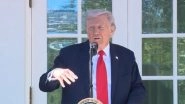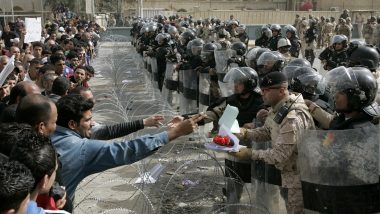Even as a section of the first-world slipped from liberalism to conservative populism, masses in several third-world countries hit the streets this year with the aim of bringing "true democracy" to their respective lands. The regime change movements, which are still ongoing, have yielded successes in several parts of the world as heads of the incumbent ruling class tendered their resignations to placate the protesters. The pro-democracy movements, however, were not thwarted and have now intensified into revolutions. Here are five major nations rocked by anti-government protests.
Algeria: The North African nation had been simmering with angst against their political class since the Arab Spring of 2011-12. The country had then survived a regime change due to the "rubber-stamp democracy" -- as critics describe -- it had enacted in the 90s'. In April this year, however, the Algerian President for last 20 years, Abdul Aziz Bouteflika, was forced to resign as protesters laid siege on streets of the capital Algiers to mark their angst against unemployment and rising inflation. The protests have now entered into their 40th week with protesters seeking the enactment of a new Constitution which guarantees civilian supremacy.
Sudan: The students' revolution in Sudan, which turned intense since January this year, led to the resignation of President Omar al-Bashir, who ruled the nation for 30 years. He was replaced by the Transitory Military Council (TMC) -- which has faced massive civilian protests for allegedly attempting to subvert civilian democracy and impose martial law in the nation. After weeks of standoff in Khartoum, the protesters and the TMC inked a pact to grant the incumbent institutions a period of 39 months to formulate a new code of civilian democracy in the nation.
Hong Kong: The pro-democracy marches and demonstrations, which began against a controversial legislation brought by the government that mandated the extradition of political prisoners to China, has now turned into a movement to seek greater autonomy rights from Beijing. The agitation was first initiated in June and achieved its success after Hong Kong Chief Executive Carrie Lam revoked the legislation in September. The protesters, however, did not wither away and are now seeking enhanced autonomous status under the Chinese rule. The movement is now also espousing the cause of Uighur Muslims, who are reportedly being subjected to persecution in China's Xinjiang province.
Lebanon: In the Levantine nation, anti-government protests erupted in October this year, with hundreds of civil society members cutting across religious and sectarian groups united to launch a regime change movement. While the taxes imposed on gasoline and petroleum was the immediate trigger for protests, observers claim that the angst in Lebanese society has been simmering over the past decade due to rising unemployment, inflation and falling per capita spending capacity. The protests, now being led by an array of pluralistic parties, have opined that incumbent sect-reserved based system of governance needs to be replaced with a robust democratic mechanism. The movement, which was underway, achieved its first success on October 29 when Prime Minister Saad Hariri resigned. A total of seven people have also died so far in clashes with security personnel.
Iraq: The month of October also saw a diverse section of Iraqi society, comprising of Christians, Shias and Sunnis, coming together to protest against the 19-year-old US-installed regime whose tenure has been marked by falling income, shrinking GDP and rising unemployment. The protesters were also wary of increased Iranian influence in the country's governance. In the crackdown launched by the government, 511 protesters have been killed so far. A partial success was achieved by the Iraqi Intifada -- as the protest is referred to colloquially in the region -- as Prime Minister Adil Abdul-Mahdi announced on 29 November that he would resign.
The year 2020 holds key to the prospects of pro-democracy movements in the above countries. The agitation would either lead to a fresh dawn in these nations, with an effective democratic setup replacing the state of quasi-totalitarianism, or they may end up being subjected to a crushing repressing by the military establishment currently occupying the ultimate helm of power.
(The above story first appeared on LatestLY on Dec 28, 2019 01:14 PM IST. For more news and updates on politics, world, sports, entertainment and lifestyle, log on to our website latestly.com).













 Quickly
Quickly


